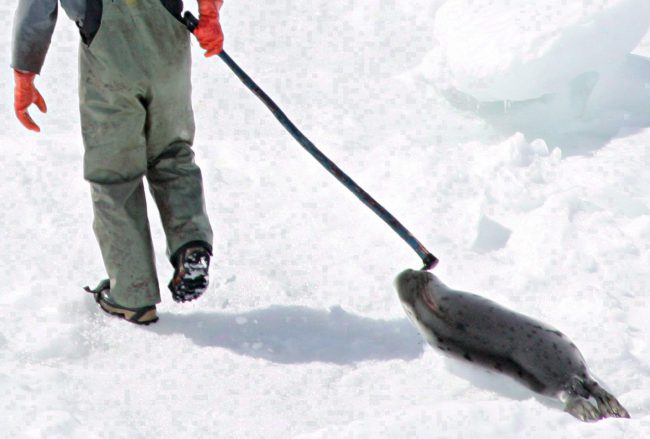Indian trade authorities have slapped a ban on imports of seal products, just as Canada’s commercial sealers gear up for the annual East Coast seal hunt.

The move comes after years of campaigning by animal rights groups who argued that seals and seal pups go through undue suffering when they are shot and clubbed to death for their skin and fur, the Press Trust of India reported.
READ MORE: N.S. fishermen caught on video abusing, killing seal pup handed hefty fines
While India has traditionally not been a significant importer of seal products, the ban is still a blow to Canada’s commercial sealing industry as it looks to emerging markets to help compensate for U.S. and European Union bans, according to N.G. Jayasimha, managing director of Humane Society International’s India chapter.
“With dwindling world markets for seal products, the Canadian sealing industry is counting on countries like India and China to import the seal fur, oil and meat that other nations refuse to buy and I am glad that India has chosen compassion over cruelty,” Jayasimha said in a statement.
“We are certain that this choice will be the last nail in the coffin for the sealing industry.”
The ban was also lauded by PETA India, which has previously aired TV ads condemning Canada’s commercial sealing industry and encouraging Indian tourists not to visit Canada. The group also circulated an online petition calling from Prime Minister Justin Trudeau to end federal subsidies on commercial sealing.
WATCH: Seal meat and its uses

India becomes the 35th country to issue import bans on commercial seal products, after the 28 EU countries, the United States, Switzerland, Russia, Belarus, Kazakhstan and Mexico.
Canada and Norway appealed the 2010 EU ban on the basis that it violated World Trade Organization guidelines and stood to hurt the livelihoods of coastal and Aboriginal communities. But the WTO upheld the ban in 2014, after adding an exception for products obtained from seals hunted by Inuit and other Indigenous communities.
It’s not clear whether India’s ban includes any such exemption.
READ MORE: Seal meat at Toronto restaurant sparks row between animal rights groups, Indigenous activists
Canada has long been the world’s biggest exporter of seal products, which include clothing, meat and health-supplementing oils.
But yields from Canada’s seal hunts have dropped steadily over the years; only 66,800 harp seals were harvested in 2016, compared to 312,000 harp seals in 2002, according to Fisheries and Oceans Canada.
Just over 10 per cent of Canada’s 9,710 commercial seal license holders were estimated to have taken part in the 2016 harvest.
READ MORE: Hunters call for more licences, possible seal cull to combat growing population off N.L.
The Canadian government stopped issuing new commercial sealing licenses in 2013, but a surge in seal populations on the East Coast prompted the Canadian Sealers Association to call for new sealer licenses, and a harp seal cull.
- Posters promoting ‘Steal From Loblaws Day’ are circulating. How did we get here?
- Video shows Ontario police sharing Trudeau’s location with protester, investigation launched
- Canadian food banks are on the brink: ‘This is not a sustainable situation’
- Solar eclipse eye damage: More than 160 cases reported in Ontario, Quebec




Comments